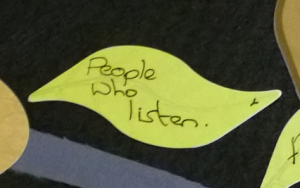In the past year, I have processed data from various engagement workshops from a broad range of topics: mental health & stigma, innovation, a wetland landscape partnership action plan, living well with dementia, housing and support for the young homeless and several more. During the analysis of thousands of ideas, opinions and comments, there is one lesson that stood out: Listen!

This Ketso leaf is from a workshop at a North West Dementia Action Alliance learning event on ‘Living well with dementia’ (see more information here).
Too often, professionals think that they need to plan and provide for people, especially vulnerable people. In March, I was at a seminar on urban accessibility. The participants were asked to brainstorm on transport and social inclusion. Concepts like equality and access appeared on the flipchart and I added ‘Actually ask people what they need’. When the lecturer, an urban planner, read out the list, he expressed his doubts if people would actually know their own needs if they had never had access to certain services. It was a throw-away comment, yet allowed a glimpse of a common belief among planning professionals, the ‘we-know-best belief’.
Why is it just so essential to listen?
If we listen, we learn, because most people actually do know very well what they need, what improvements could be done to the services they are using. They have ideas for their neighbourhood, they know what should be changed or what is missing. Urban and transport planners would do well capturing this so-called ‘local knowledge’ in order to make their interventions a success.
If we listen and take people’s opinions seriously, there is a better chance that people will accept the intervention, maybe even regard it their own. In the past few years, we have experienced massive protests against the reconstruction of the Stuttgart main station (Stuttgart 21), protests in Berlin led to significant changes in the land-use plans for the area of the old Tempelhof airport, and finally citizens rejected the Hamburg cable car project through a referendum. Citizens are no longer satisfied with being planned for. Increasingly, successful projects are those that involve the public from the start. Time to rethink the planning for people paradigm and develop a planning with people approach.
Most importantly, however, I believe that it is a democratic imperative to listen and to take into account the opinions of those people who will have to live with the decisions that are being taken, the new infrastructure, the modified service. I believe that genuinely listening increases our understanding of other people’s realities and can build trust, solidarity and tolerance, and that is important as a moral resource of a society far beyond any urban intervention.
Public engagement does not always lead to consensus. That would be a false hope. Nevertheless, getting service users and service providers, public authorities and non-governmental organisations, professionals and volunteers … together in a room to start to understand each other’s perspectives and develop ideas for a good way forward – I think that is a good start for a sustainable intervention, one that lasts long into the future.
